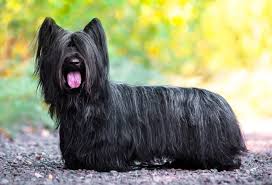
Skye Terrier
Conditions of detention
Skye Terriers are adaptable and can thrive in various living conditions, including apartments and houses with yards. They do well in both urban and suburban environments as long as they get enough exercise.
Useful Fact: Due to their low energy levels indoors and moderate exercise needs, Skye Terriers can adapt well to apartment living if they receive regular walks and playtime.
Nutrition and diet
A balanced diet rich in high-quality proteins, fats, and essential nutrients is crucial for the Skye Terrier. Their diet should support their moderate activity level and maintain their overall health.
Useful Fact: Monitoring portion sizes and providing a diet appropriate for their age, weight, and activity level helps prevent obesity, which can be a common issue in small breeds.
Health
Skye Terriers are generally healthy dogs with a lifespan of 12-14 years. However, they can be prone to specific conditions such as hip dysplasia, patellar luxation, and eye disorders.
Useful Fact: Regular veterinary check-ups and genetic testing can help detect and prevent common health issues in Skye Terriers.
Grooming and care
Skye Terriers have a long, silky coat that requires regular grooming to prevent matting and tangling. Weekly brushing is recommended to keep their coat in good condition.
Useful Fact: Regular grooming sessions not only keep their coat healthy but also help in early detection of skin issues or parasites.
Education and training
Skye Terriers are intelligent but can be independent and stubborn. Consistent, positive reinforcement methods work best for training.
Useful Fact: Early socialization and obedience training are crucial to develop good behavior and ensure they are well-adjusted adults.
Toys and entertainment
Interactive toys, puzzle games, and activities that stimulate both their mind and body are ideal for keeping a Skye Terrier entertained.
Useful Fact: Skye Terriers enjoy activities that challenge their natural hunting instincts, such as fetch games and scent-tracking exercises.
Safety
Ensure your home and yard are secure, as Skye Terriers have a strong prey drive and may chase after small animals if given the chance.
Useful Fact: Microchipping your Skye Terrier can help ensure their safe return if they ever get lost.
Accessories
Sturdy collars, harnesses, and leashes are necessary for daily walks. Grooming tools like brushes, combs, and detangling sprays are also essential.
Useful Fact: High-quality, durable chew toys can help maintain their dental health and provide mental stimulation.
Socialization
Early and regular socialization with other dogs, animals, and people is crucial for a well-rounded Skye Terrier. This helps in developing a friendly and confident demeanor.
Useful Fact: Puppy classes and regular playdates with other dogs can enhance their social skills and reduce shyness or aggression.
Travel and Transportation
Skye Terriers adapt well to travel, but ensuring they are comfortable and secure in a car or crate is important for safety.
Useful Fact: Gradual introduction to car rides and providing familiar toys or blankets can ease travel anxiety.
Behavior and psychology
Skye Terriers are known for their loyal, affectionate, and intelligent nature. They thrive on companionship and mental stimulation, making them loyal and engaging pets.
Useful Fact: Mental exercises, such as learning new tricks, can prevent boredom and associated behavioral issues. Skye Terriers are known for their alertness and make good watchdogs despite their small size.
Legal aspects
Owning a Skye Terrier may require specific licenses or adherence to local regulations regarding pet ownership. Ensure your dog is registered and vaccinated according to local laws.
Useful Fact: Familiarize yourself with breed-specific legislation in your area to avoid any legal complications.


